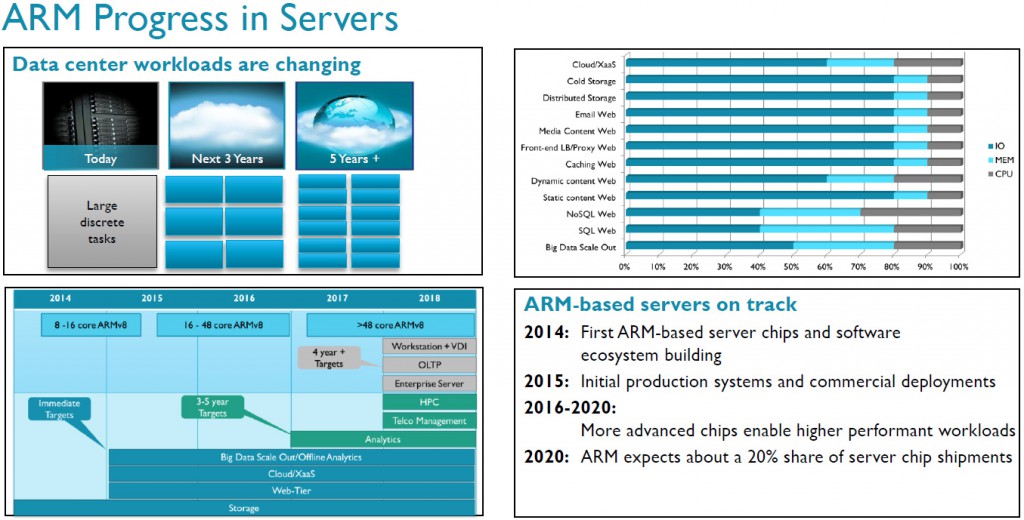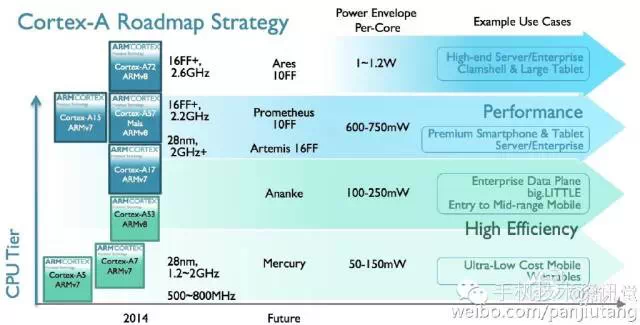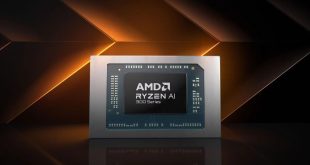Despite of a lot of hype about ARM-based servers in the recent years, actual number of their deployments remains very low. However, ARM Holdings is optimistic about its market opportunities and expects 20 per cent of servers to be ARM-based by 2020. In a bid to dramatically increase its share of that market, ARM plans to introduce new cores as well as to enable its partners to build chips with over 48 cores in 2017 – 2018.
ARM admits that its current position on the market of server-class system-on-chips is not exactly good and will not improve significantly until 2016 or even 2017. Nonetheless, the company stresses that it is possible to buy ARM-based servers right now in order to develop software. Makers of servers are also interested in microprocessors from alternative suppliers since today 98 per cent of server central processing units are sold by Intel Corp.
“I think the level of interest we see in ARM-based servers remains very, very high,” said Tim Score, chief financial officer or ARM, during the company’s quarterly conference call with investors and financial analysts. “Everyone I speak to absolutely wants an alternative.”
Once server-class software stack for ARM is ready and once there are 64-bit ARMv8-compatible CPUs with performance and capabilities sufficient for modern datacenters, actual demand for ARM-based servers will pick up, according to the company.
“I do not think that server shipments are going to be a material driver of royalty this year, I think we’re still in the development phase of that,” said Simon Segars, chief executive officer of ARM. “You can buy an ARM-based server right now. […] It is progressing forwards, but I do not think it is going to be a meaningful driver of royalty revenues this year; it is probably more into 2016 – 2017.
At present ARM targets storage, web-tier, cloud and scale-out servers with its ARMv8-A architecture as well as Cortex-A57 and Cortex-A72 cores. Three to five years down the road, the company will have improved ARMv8-A architecture as well as higher-performing code-named “Ares” and “Prometheus” cores. ARM expects that the new technologies as well as speedier cores will help it to address real-time analytics as well as high-performance computing applications. Eventually, ARM wants to compete directly with Intel Xeon processors for enterprise-class servers.
Right now, we do not know a lot about ARM’s future server-class cores. What we do know is that the company’s Cortex-A72 – which is 80 – 90 per cent faster than the Cortex-A57 – has 1–1.2W power envelope per core, which is comparable to that of Intel's “Broadwell” cores inside the company’s Core M and Xeon D processors. Based on the company’s roadmap leaked recently, ARM is also working on the code-named “Ares” core for high-performance applications, which is going to be made using 10nm FinFET process technology and which will at least double performance of ARM’s Cortex-A72. For ultra-dense servers that do not require truly high single-thread performance, ARM is prepping code-named “Prometheus” technology with 600-750mW thermal design power per core.
ARM did not comment on characteristics of its future Cortex-A cores.
Discuss on our Facebook page, HERE.
KitGuru Says: ARM continues to be very optimistic about its server-class solutions and expects its partners to offer an alternative to Intel’s Xeon microprocessors for every single market segment. But even if ARM manages to create cores that are comparable to Intel’s in terms of performance, functionality and power consumption, it remains to be seen whether ARM’s partners will actually be able to compete against Intel. AMD once had a strong lineup of Opteron processors for servers that outperformed Intel Xeon products. However, the company could not fight against its arch-rival for a long time because of financial and business reasons…
 KitGuru KitGuru.net – Tech News | Hardware News | Hardware Reviews | IOS | Mobile | Gaming | Graphics Cards
KitGuru KitGuru.net – Tech News | Hardware News | Hardware Reviews | IOS | Mobile | Gaming | Graphics Cards






The only thing ARM will be able to expose is how ridiculously (sometimes even borderline anti-competive) strong Intel’s position is in this market. And I am not talking about performance or efficiency.
For that case alone I hope it succeeds. Maybe it lights an emergency flare or two.
➯➯➯➯➯I RECEIVED FIRST DRAFT OF $13000!@ak10:
,,
➨➨➨➨https://FreeQuickerAdvices.com/meet/suitcase…